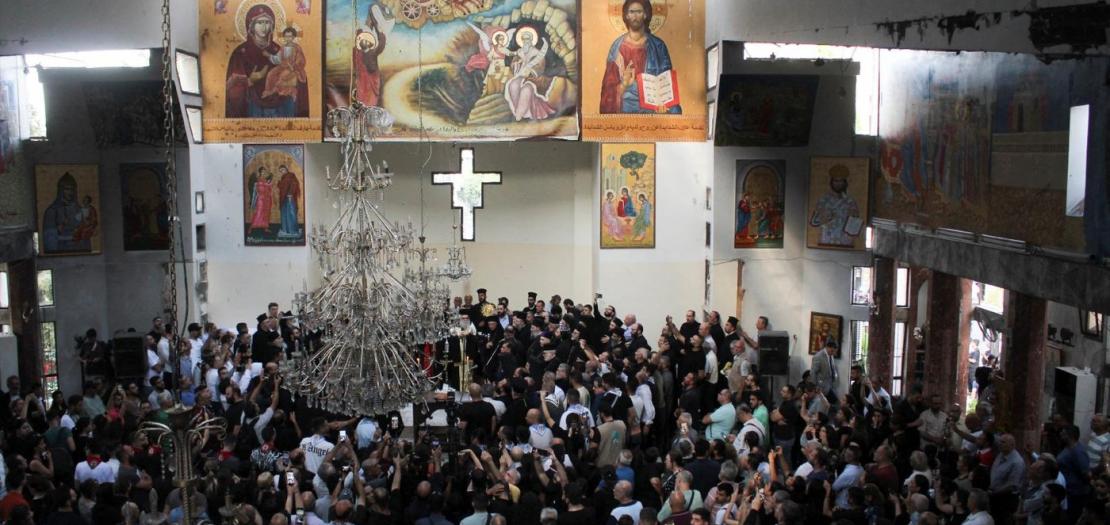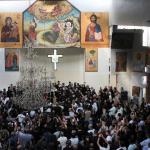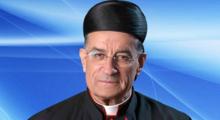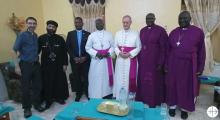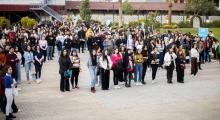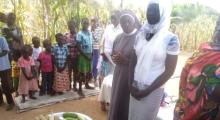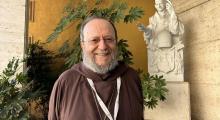Issued by the Catholic Center for Studies and Media - Jordan. Editor-in-chief Fr. Rif'at Bader - موقع أبونا abouna.org
Fears mount for Syrian Christians about whether the new Islamist government is committed to their protection following the recent deadly church suicide bombing in Damascus.
Religious freedom advocates say the United States should have further tied its ending of sanctions on Syria to respect for minority rights in the country.
“We feel that we are alone,” said Father Fadi Azar. “Christians in Syria are feeling a great pain,” the Syrian Franciscan priest said, recalling the deaths of 30 parishioners and 54 wounded in the St. Elias Greek Orthodox Church shooting and bomb attack on June 22 that has left many traumatized.
“We have faith, we are not afraid. The persecution of Christians in the Middle East, in the Holy Land, has always existed. There has been persecution for 2,000 years,” the Catholic priest told the pontifical charity Aid to the Church in Need on June 26.
“Christians have the right to live in a country where there is security, so they can go to church and pray in peace,” Father Azar said of the historic Christian community that traces its spiritual roots to the conversion of St. Paul on the road to Damascus and the early church.
Worldwide revulsion and condemnation of the horrific attack was swift from political and religious leaders, including the Vatican. Yet, Christians and others in Syria’s rich religious and ethnic mosaic say they feel vulnerable because the new Islamist-led government of Ahmad al-Sharaa, formerly of al-Qaida and Hayat Tahrir Sham terrorist groups, has placed Syrian and foreign jihadists in key security roles.
Despite the government's claim that the Islamic State was behind the attack, observers say questions remain about the real identity of the suicide bomber.
“Every time the church speaks with the government, they say it’s an isolated incident,” Father Azar said of sectarian attacks. “Until this serious moment arrived that has ‘touched’ all of Syria,” he said.
Nadine Maenza, president of the Washington-based International Religious Freedom Secretariat, called the church bombing a stark reminder of the threat that Christians and other minorities face in Syria: “There hadn’t been an attack on a church in Syria since 1860.”
Following the suicide bombing, “we heard there were threats to a church in Homs and other places,” Maenza told The Greek Current podcast. “Christians and religious minorities are all on edge, but especially the Christians are.” They’re asking the government “to be stronger in support of the churches,” she said.
“This attack has created serious problems, not only from the standpoint of social and economic stability, but also from the perspective of the faithful,” said Syrian Bishop Hanna Jallouf, the apostolic vicar of Aleppo in remarks to Vatican News. Bishop Jallouf acknowledged that “if 20 per cent of the population was considering leaving the country before the terrorist attack, the percentage has now risen to 90 per cent: People are increasingly afraid.”
Deadly violence against Alawites and Druze and now the church bombing make Syrians doubt the government’s ability and resolve to provide security to all of Syria’s citizens.
Before the 13-year civil war, Christians made up about 10 per cent of the 22 million population in Syria, but an analysis estimated there could be not more than 300,000 Syrian Christians in the country at the moment. The civil war witnessed thousands of Christians forced to flee their homes due to threats from extremist groups, like the Islamic State.
“We are asking for the intervention of the Vatican, of the European Community,” said Father Azar, the Franciscan priest. “People are now telling us, ‘Father, we don’t want aid, we don’t want food, medicine, nothing. Help us escape. We can’t live here. We are afraid for our lives; we are afraid for the future of our children'.”



